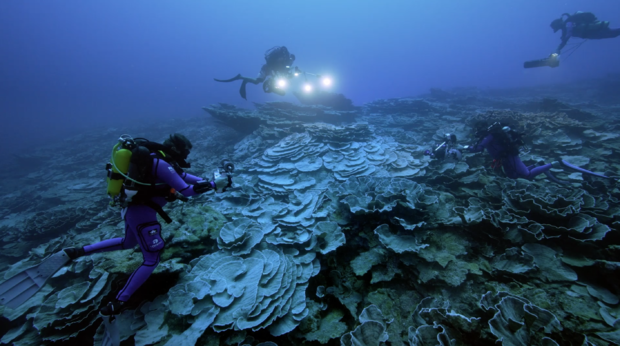"Magical" massive coral reef discovered deep below surface in Tahiti "twilight zone"
Deep underwater in the ocean's twilight zone feet below the surface, lies a community of bioluminescent fish, squid, octopuses and jellyfish. Off the coast of Tahiti, divers found that the mysterious, dim-lit zone is also home to species that typically need sunlight and shallow warmth to thrive — coral.
A group of scientist divers discovered a massive reef of rose-shaped corals between roughly 98 and 213 feet below the Pacific Ocean's surface near French Polynesia's Tahiti islands, UNESCO announced on Thursday. The reef, discovered in "pristine" condition in November, stretches nearly two miles long and 200 feet wide. The rose-shaped corals are giant, measuring up to more than 6.5 feet across.
It's believed to be "one of the most extensive healthy coral reefs on record," UNESCO said.
"We know the surface of the moon better than the deep ocean. Only 20% of the entire seabed has been mapped," UNESCO Director General Audrey Azouley said in a news release. "This remarkable discovery in Tahiti demonstrates the incredible work of scientists who, with the support of UNESCO, further the extent of our knowledge about what lies beneath."
The finding, as UNESCO said, is "highly unusual," as coral tends to grow in depths of up to about 82 feet, where the water is warmer and receives more light. Divers logged roughly 200 hours of time underwater to study the reef, UNESCO said, essentially going into uncharted territory.
Deep coral reefs have not previously been able to undergo extensive studying because of the available diving tools. But divers now have the necessary tools to dive longer at greater depth, and are planning to continue studying the area.
Alexis Rosenfeld, one of the divers who explored the reef, said in a Facebook post written in French that the reef is akin to the work of a "great seamstress." In a statement, he added that "it was magical to witness giant, beautiful rose corals which stretch for as far as the eye can see."
"It was like a work of art," he said.
UNESCO said on Twitter that the discovery is "a great leap forward" for science, as it was found as part of the organization's efforts to map the ocean.
Globally, coral reefs are in danger.
In 2020, scientists warned that coral reefs will decline by 70-90% within 20 years due to severe bleaching from global warming. Bleaching is a condition in which the coral's algae leaves, turning it white and making it more susceptible to disease.
By 2100, researchers found, climate change and pollution will make the ocean so acidic that nearly all coral reef habitats are expected to be eliminated. The only coral reef sites that scientists said would still be viable by that time are small portions of Baja California and the Red Sea, neither of which are ideal because of how close they are to rivers.
A study published in One Earth in September found that global coverage of living coral has declined by half from 1957 to 2007, as did reefs' capacity to support the ecosystem.
Several effects from climate change, including sea level rise, ocean acidification from fossil fuel emissions, and stronger storms, are also anticipated to take a toll on reefs, according to the Coral Reef Alliance.
And all of these factors would not just be disastrous for reefs, but for humans and marine life as well.
According to the alliance, coral reefs support more than 500 million people worldwide by providing food, income, and coastal protection, among other things. Reefs are also home to "the highest number of species of any ecosystem besides rainforests," according to the Alliance.
But the newly discovered reef could offer a sign of hope.
Researcher Laetitia Hedouin of France's National Centre of Scientific Research said that French Polynesia suffered a "significant" bleaching event in 2019, but that the reef "does not appear to have been significantly affected."
"The discovery of this reef in such a pristine condition is good news and can inspire future conservation," Hedouin said. "We think that deeper reefs may be better protected from global warming."







